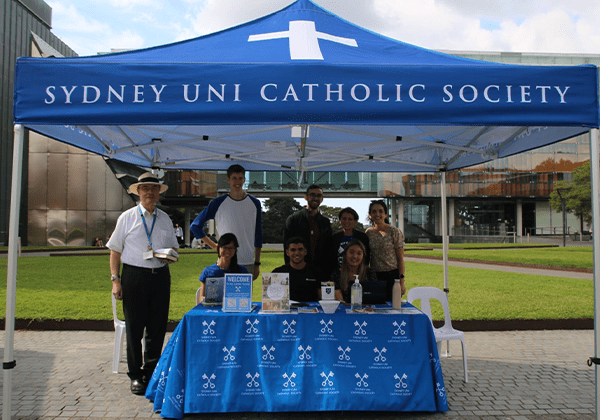The University of Sydney (USyd) Disabilities Collective has engaged in discussions with the USyd Catholic Chaplaincy over an ableist sign displayed for Life Week by the USyd Catholic Society that read “Are disabled people a burden on society?” The sign was placed on Eastern Avenue for several hours before being removed at the request of the USU.
CathSoc has a long history of controversy and clashes with student activists, having participated in the Vote No campaign against gay marriage and holding anti-abortion lectures and events. Following the sign controversy, the society has been suspended temporarily by the USU.
The initial discussion involved the Disabilities Officers, representatives from the USU and the Chaplaincy. The line of distinction between CathSoc and the USyd Catholic Chaplaincy remains unclear; while the two organisations are separate on paper, there appears to be a high level of cooperation between the two organisations to the point where accountability became complicated.
WHAT HAPPENED?
Following the incident, the Disabilities Officers contacted the USU, demanding a “formal, unqualified apology from CathSoc and a commitment from them to engage more respectfully with disabled students in future.”
In communications between the Disabilities Officers and the USU, it was confirmed that the event had not been registered or approved by the USU, and upon being asked to remove the sign, a person from the stall explained that “the event was not a society event and [was] organised and booked through the USyd Chaplaincy.”
The CathSoc Facebook page tells a slightly different story; in two Facebook posts, CathSoc took responsibility for the signage.
However, the Disabilities Officers wrote to the USU that “neither of these statements meets our request for an unqualified apology, given that in both instances, the Society has attempted to defend their actions by couching the apology in appeals to intellectual debate.”
In the weeks following the incident, a mediated meeting was organised between the Disabilities Officers, the USyd Catholic Chaplaincy and the USU, in order to engage in discussions around the impact of the ableist sign and accountability measures.
While it was requested that members of the Catholic Society executive attend the meeting, they were notably absent.
However, in later communications, the Catholic Chaplaincy said that Alexander Gavazzi, the Chaplaincy’s representative at the meeting, had since left the organisation and had not relayed the meeting details to CathSoc.
Since Gavazzi’s departure, the Catholic Chaplaincy has endorsed CathSoc’s statement on the Facebook page and written that they are not opposed to disability awareness training or inviting disabled speakers to speak at future Chaplaincy events.
WHO IS RESPONSIBLE?
CathSoc has an extensive history of controversial pro-life stunts and events. The key concern raised by the incident of the ableist sign is the lack of distinction between CathSoc and the USyd Catholic Chaplaincy as organisations, begging questions of accountability and who to hold responsible.
While the Catholic Chaplaincy has said that CathSoc is “separate and distinct to the Chaplaincy” this distinction has not always been clear. For instance, the website for the Chaplaincy also doubles as the website for CathSoc.
Additionally, according to a USU email, upon being questioned about the ableist sign, a representative of CathSoc at the stall “obligingly removed the sign and explained to [USU] staff that the event was not a society event and that it was organised and booked through the USYD Catholic Chaplaincy.”
Yet, the Catholic Chaplaincy has not made any concrete commitments to respectful engagement with the disabilities community, nor has the Chaplaincy made a formal apology, instead deferring to the statement that “the Chaplaincy is unable to bind the Society to any position.”
There remain unanswered questions about the distinction and level of cooperation between the two organisations, or who has been held accountable for the displaying of the sign. It was revealed in the latest USU board meeting that CathSoc has been suspended until mid-August and has been mandated to undergo sensitivity and empathy training.
In response to CathSoc’s suspension, the Disabilities Officers told Honi that while they were “glad to hear that the USU has enforced mandatory sensitivity training for the Catholic Society” they were also “disappointed in the failures of process that led to this point”.
The Disability Officers criticised the Chaplaincy for “repeatedly intercept[ing]” attempts to engage with CathSoc. They noted that “To this date we still have not spoken directly with a single member of the Catholic Society or its executive, nor have they extended any kind of formal apology beyond the disappointing Facebook statement posted earlier this year.”
“Disabled students deserve a learning environment free from discrimination, and they deserve to know that the university will respond appropriately to discriminatory behaviour on campus.”
*The USyd Catholic Society did not respond to Honi’s request for comment.





